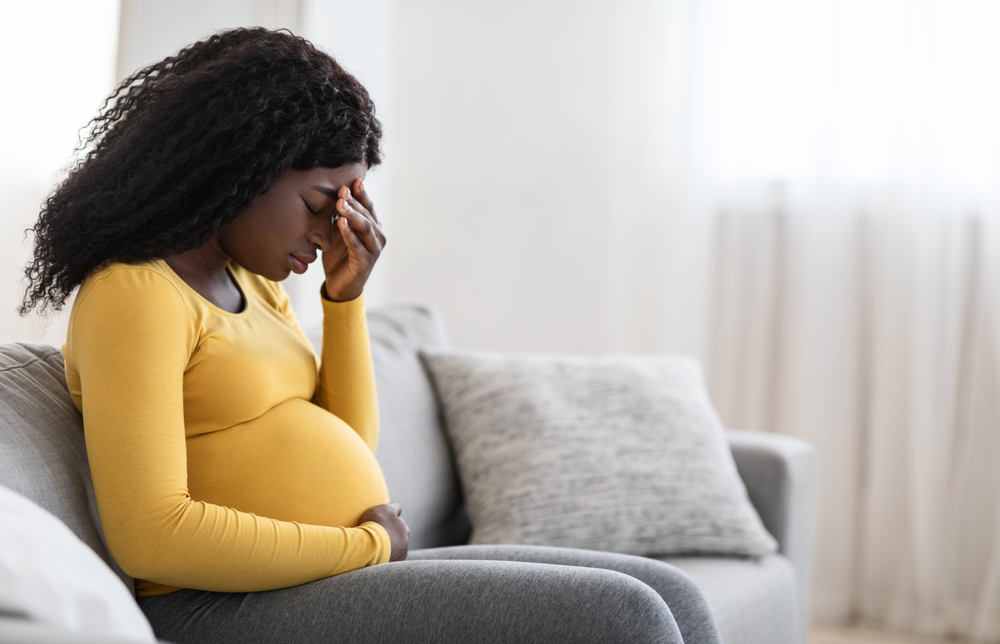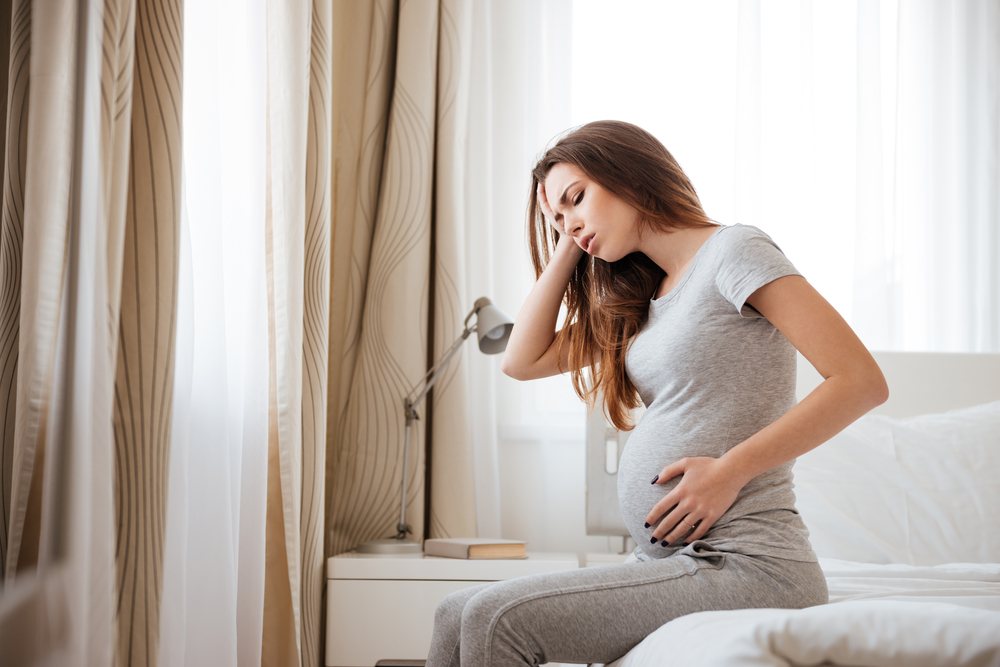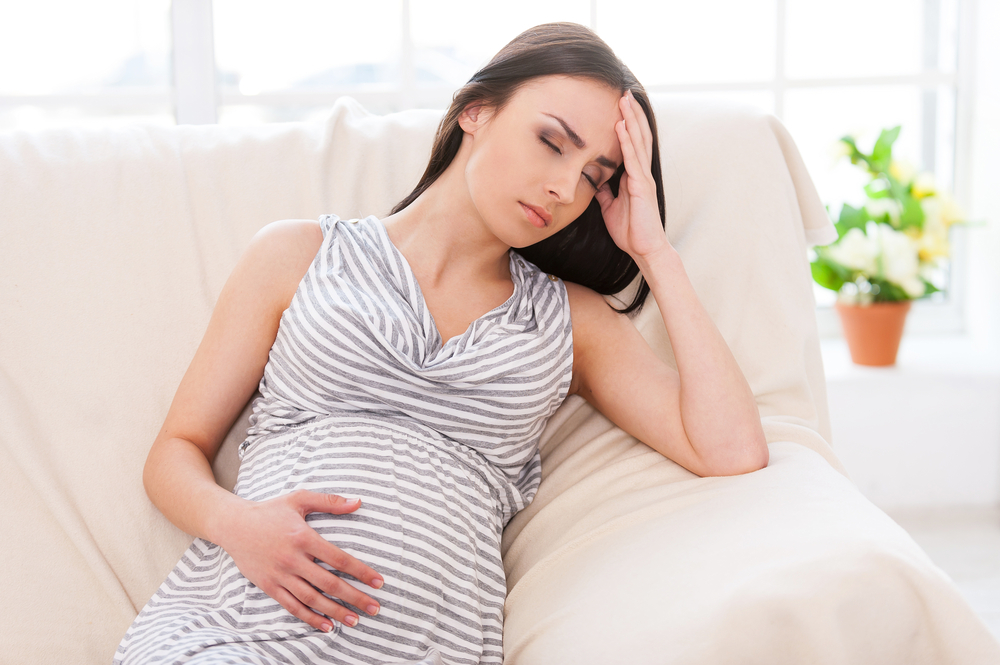Protecting You and Your Future Child
Sleep apnea is a sleep disorder that affects many people and can have numerous, severe health effects. These effects can be amplified if you’re pregnant. Sleep-disordered breathing disrupts your sleep throughout the night, preventing you from rehabilitating and creating a dangerous environment for your future child. Fortunately, at Sac Sleep and Breathing, Sacramento, CA sleep dentist, Dr. A. Scott Grivas III offers sleep medicine solutions to help treat sleep-disordered breathing. That way, you can have a safer pregnancy and ensure your future child’s health.
Learn more about why treatment for sleep apnea in pregnancy is especially vital, by dialing (916) 735-4060.

What is Maternal Obstructive Sleep Apnea?
Obstructive sleep apnea causes the airway to relax during sleep, effectively blocking air passage. This blocks off breathing, causing the individual to wake up abruptly throughout the night. A primary cause of obstructive sleep apnea is weight gain, so the natural weight gain of pregnant patients can trigger pregnancy-related issues with breathing during sleep.
Pregnant individuals are at an increased risk of adult obstructive sleep apnea because as their hormone levels rise, the membranes in their faces can swell and result in obstructed breathing. This set of circumstances is what leads to maternal obstructive sleep apnea. In cases of more severe sleep apnea, the worse the outcome tends to be for the pregnant individual and the future child.
Understanding your own risks and signs of obstructive sleep apnea is important to help identify an issue and seek treatment quickly. Without professional sleep medicine, sleep apnea can have harmful effects on you and your future child.



Signs and Symptoms of Maternal Obstructive Sleep Apnea
The most common indicators of pregnancy and sleep-disordered breathing occurring at once include:
- Loud Snoring – Pregnant individuals may develop or worsen snoring as pregnancy progresses due to weight gain, nasal congestion, and hormonal changes affecting the airway.
- Daytime Sleepiness – Excessive daytime sleepiness and fatigue can indicate disrupted or poor-quality sleep due to apnea events.
- Gasping/Choking At Night – A pregnant person may exhibit breathing pauses during sleep followed by gasping or choking sounds as breathing restarts.
- Insomnia – Difficulty falling asleep or staying asleep can be due to sleep-disordered breathing, as the frequent awakenings disrupt sleep.
- Morning Headaches – Morning headaches can occur due to oxygen desaturation and disrupted sleep from sleep-disordered breathing at night.
- High Blood Pressure – Sleep disordered breathing leads to intermittent hypoxia which can cause a rise in blood pressure, a particular concern in pregnancy.
- Restless Sleep – A pregnant person may have excessive tossing, turning, and leg jerking at night due to efforts to breathe during apneas.
- Frequent Nighttime Urination – Sleep apnea and pregnancy can both independently cause frequent trips to the bathroom at night, interrupting sleep. The combination compounds the problem.
- Increased Irritability – Mood disturbances like irritability and depression are common with poor sleep. The hormonal changes of pregnancy also contribute to mood symptoms and sleep apnea during pregnancy further exacerbates irritability. Combined with pregnancy, sleep apnea often results in more serious emotional disturbances.
- Difficulty Focusing – The fatigue and daytime sleepiness due to repeated sleep interruptions from sleep-disordered breathing can impair attention, concentration, and focus during daytime for pregnant individuals. This also poses safety risks if driving or operating machinery when drowsy.
Dangers of Untreated Sleep Apnea During Pregnancy
Prompt treatment of maternal obstructive sleep apnea is vital to ensuring your health and the health of your future child. Some of the dangers of untreated obstructive sleep apnea or other types of sleep apnea during pregnancy include the following:
Physical Health Issues
- Low Blood-Oxygen Levels – Sleep-disordered breathing causes pauses in breathing during sleep, leading to drops in oxygen saturation. Low oxygen in pregnant individuals impacts oxygen supply to the fetus, potentially impairing fetal development and growth.
- Gestational Diabetes – Poor sleep and intermittent hypoxia from sleep-disordered breathing can disrupt glucose metabolism. This can worsen gestational diabetes risk and severity during pregnancy due to metabolic changes and inflammation.
- Preeclampsia (High Blood Pressure) – Sleep apnea is associated with hypertension. The combination of hypertension in pregnancy along with spikes in blood pressure from intermittent hypoxia heightens the risk for developing preeclampsia and its complications.
- Unplanned Cesarean section – Maternal sleep-disordered breathing increases the chances of complications with pregnancy like restricted fetal growth or distress, and can also lead to an unanticipated C-section delivery.
- Pulmonary Edema (Excess Fluid in The Lungs) – The pressure swings in the thorax during sleep-disordered breathing, along with fluid shifts associated with pregnancy can overload the lungs, resulting in fluid accumulation and edema.
- Prolonged Labor – Research from the American Journal of Obstetrics & Gynecology suggests that chronic fatigue and poor sleep from untreated sleep-disordered breathing during pregnancy may lead to a longer duration of active labor due to altered uterine contractility.
- Fetal Growth Issues – Placental and fetal oxygenation issues from maternal sleep apnea can impair fetal development and intrauterine growth.
- Increased Risk of Neonatal Intensive Care – Babies born restricted or prematurely due to pregnancy complications worsened by sleep-disordered breathing require higher monitoring and intensive care after birth.
Mental Health Problems
- Increased Stress and Anxiety: The extra stress and anxiety from untreated sleep apnea during pregnancy release hormones that might harm the developing baby. High-stress levels are linked to preterm birth and lower birth weight. It could also lead to issues like gestational hypertension, making the pregnancy more complicated.
- Mood Swings and Irritability: Mood swings and irritability, worsened by sleep troubles and hormonal changes, create an emotionally shaky environment for the future child. The pregnant person’s changing emotional state might affect the developing nervous system of the fetus and how the future child handles emotions later in life. It also adds more stress for the pregnant person, making sleep apnea and obstructive respiratory events worse.
- Impaired Cognitive Function: Not getting enough sleep, erratic sleep patterns, and struggling with clear thinking might make it hard for the pregnant person to make good choices about their health. This can lead to not-so-healthy practices, affecting both the pregnant individual and the future baby’s health. For instance, trouble concentrating could make it tough to stick to recommended lifestyle changes.
- Depressive Symptoms: Depression linked to untreated sleep apnea during pregnancy raises the risk of preterm birth, low birth weight, and developmental problems in the future child. The stress and emotional strain might negatively affect hormones, affecting the placenta and fetal development. Plus, it can make it harder for the pregnant individual to take care of themself during pregnancy.
- Impact on Partner Relationships: Relationship problems because of sleep issues can reduce emotional support, which is crucial during pregnancy. Lacking support within the partnership could stress the pregnant person, potentially affecting the future baby’s development. Positive partner relationships are linked to better outcomes during pregnancy.
- Reduced Coping Mechanisms: Trouble coping due to sleep apnea’s impact on clear thinking might affect how the pregnant person handles stress. This can influence the body’s stress response, potentially affecting the baby’s growth. Managing stress is important for keeping a stable internal environment for the baby.
- Exacerbation of Existing Mental Health Conditions: For pregnant individuals with existing mental health conditions, sleep apnea in pregnancy could make it hard to stay healthy and stick to treatment plans. The interaction between untreated sleep apnea and existing mental health issues makes things complex, affecting both the pregnant individual and the future child’s health.








Treatments Available in Cases of Pregnancy & Sleep Apnea
Dr. Grivas and our experienced staff understand the health risks associated with sleep apnea in pregnancy and are committed to providing care that helps you and your future child. We offer customizable treatment plans and practical solutions that alleviate your sleep-disordered breathing symptoms and reduce your risk of any complications.
Vivos Oral Appliances
Traditionally, the treatment for sleep apnea is a continuous positive airway pressure (CPAP) machine. However, many patients report that continuous positive airway pressure machines are difficult to transport, hard to use, and too loud to sleep with. At Sac Sleep and Breathing, we’re proud to offer Vivos Oral Appliances as a personalized, modern-day alternative to CPAP therapy.
The Vivos process is designed to gently but effectively treat your sleep-disordered breathing by switching between daytime and nighttime appliances. The appliances allow you to experience easier breathing patterns at night while correcting any oral issues causing your symptoms.
Sleep Hygiene & Position
Practicing good sleep habits like sticking to consistent bedtimes and wake-up times, limiting daytime naps, and creating a restful sleep environment sets the stage for better sleep. Additionally, sleeping on the left side optimizes oxygen and blood flow between the placenta and the fetus.
Side sleeping keeps airways more open and leads to better breathing patterns. Using pillows prevents rolling onto the back, which worsens obstructive sleep apnea.
Physical Activity
Staying active combats pregnancy weight gain contributing to obstructive sleep apnea. Additionally, moderate daily exercise for 30 minutes has been shown to improve sleep. Low-impact activities like walking, swimming, and yoga are usually safest for pregnancy. However, you should talk to your primary care provider to determine which exercises are safest and most effective for you.
Stress Reduction
Mindfulness, meditation, or progressive muscle relaxation before bed mitigate anxiety and stress interfering with sleep in pregnant individuals. This cultivates more restorative sleep, helps combat obstructive sleep apnea, and results in a more normal pregnancy.
Comfort Measures
As your pregnancy progresses, use extra pillows for body support. Specifically, use pregnancy pillows and wedge pillows to elevate the head, and soft mattresses to enhance comfort. Taking these steps allows for easier breathing, less pain, and a more normal pregnancy.
Frequently Asked Questions
Am I more at risk for developing sleep apnea if I’m pregnant?
Pregnant individuals face a higher risk of developing obstructive sleep apnea due to the heightened estrogen levels in the body. This results in swelling of the membrane, which causes congestion and blockages. The good news is that your sleep dentist can provide patients with sleep apnea treatments such as oral appliances to help relieve you of your sleep apnea symptoms.
How does maternal obstructive sleep apnea affect the health of the fetus?
Untreated sleep apnea during pregnancy has been linked to complications such as gestational diabetes and preeclampsia. Additionally, it may impact fetal development and increase the risk of preterm birth. Seeking timely medical advice is crucial for both maternal and fetal well-being.
Can lifestyle changes alone help manage maternal obstructive sleep apnea?
In some cases, lifestyle modifications such as maintaining a healthy weight, sleeping on the side, and avoiding certain sleep positions may help alleviate mild sleep apnea symptoms during pregnancy. However, it is essential to consult with a healthcare professional to determine the most appropriate approach for individual cases.
What impact does maternal sleep apnea have on postpartum recovery?
Sleep apnea can contribute to increased fatigue and postpartum recovery challenges. Addressing sleep apnea during pregnancy may positively impact the postpartum period by reducing the risk of complications and supporting a smoother recovery process. Discussing postpartum sleep concerns with healthcare providers is crucial for overall maternal well-being.
Prioritize the Well-Being of You and Your Baby-Call Dr. Grivas Today!
If you’re pregnant or planning to become pregnant and think you’re experiencing symptoms of sleep-disordered breathing, contact our Sacramento office at (916) 735-4060. You can also fill out our helpful contact form below to schedule your consultation and learn more about sleep apnea during pregnancy. Dr. Grivas is here to help patients from Sacramento and surrounding areas such as Sierra Oaks, Woodside Condo, and Campus Commons, CA enjoy a safer, less stressful pregnancy.
